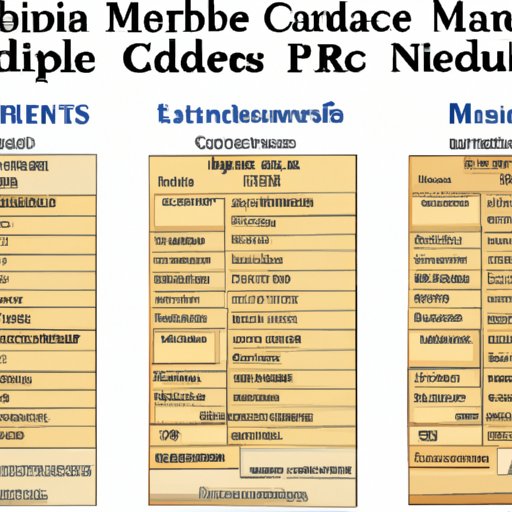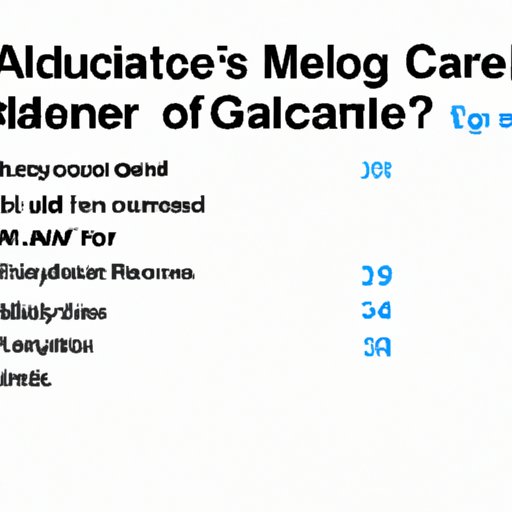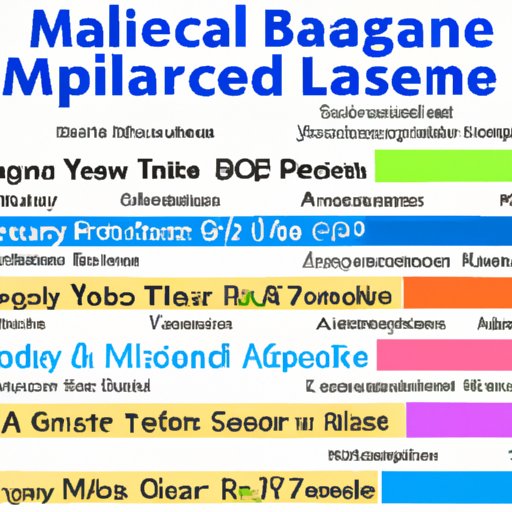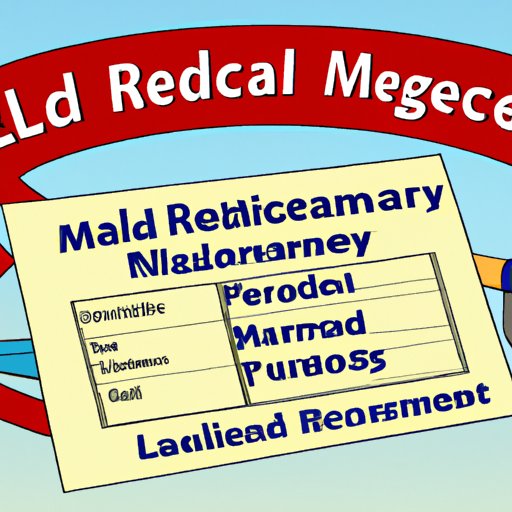Introduction
Medicare is a health insurance program administered by the federal government that provides coverage for individuals 65 and older, as well as certain younger individuals with disabilities or end-stage renal disease. While most people are aware of the age requirement for Medicare, there is often confusion surrounding exactly what age you can qualify for Medicare benefits.
In this article, we will explore the eligibility requirements for Medicare at different ages, how age impacts your ability to qualify for Medicare, and what you need to know about Medicare and age. We will also compare Medicare eligibility by age group, so you can better understand the age limits for Medicare.

Exploring the Eligibility Requirements for Medicare at Different Ages
The eligibility requirements for Medicare vary depending on your age. To be eligible for Medicare, you must be either 65 years old or older, or have a disability or end-stage renal disease. If you are 65 or older, you may qualify for Medicare Part A (hospital insurance), Part B (medical insurance), Part C (Medicare Advantage plans) and/or Part D (prescription drug coverage).
Overview of Age Requirements for Medicare Part A
Medicare Part A is available to all individuals who are 65 and older, regardless of income or medical history. If you are not 65, you may still be eligible for Medicare Part A if you are disabled or have end-stage renal disease.
Overview of Age Requirements for Medicare Part B
Medicare Part B is available to individuals who are 65 and older, as well as those who are under 65 and have a disability or end-stage renal disease. To qualify for Medicare Part B, you must be enrolled in Medicare Part A and pay a monthly premium.
Overview of Age Requirements for Medicare Part C
Medicare Part C (also known as Medicare Advantage plans) are private health insurance plans that provide coverage for Medicare Part A and Part B services. These plans are available to individuals who are 65 and older, as well as those who are under 65 and have a disability or end-stage renal disease.
Overview of Age Requirements for Medicare Part D
Medicare Part D is a prescription drug plan offered by private insurance companies that covers both generic and brand name drugs. It is available to individuals who are 65 and older, as well as those who are under 65 and have a disability or end-stage renal disease. To qualify for Medicare Part D, you must be enrolled in Medicare Part A and/or Part B, and pay a monthly premium.

How Age Impacts Your Ability to Qualify for Medicare
If you are under 65 and have a disability or end-stage renal disease, you may be eligible for Medicare regardless of your age. However, if you are 65 or older, your eligibility for Medicare depends on whether or not you are retired and collecting Social Security benefits.
Early Retirement and Qualifying for Medicare
If you retire before age 65, you may be eligible for Medicare coverage. According to the Centers for Medicare & Medicaid Services, “if you’re under 65 and you’ve been receiving Social Security Disability Insurance (SSDI) benefits for 24 months or more, you’ll automatically be enrolled in Original Medicare (Parts A and B).” [1]
Working Past Age 65 and Qualifying for Medicare
If you are still working at age 65 and do not receive Social Security benefits, you can still qualify for Medicare. According to the Centers for Medicare & Medicaid Services, “If you’re still working when you turn 65 and you have employer health insurance, you generally don’t need to enroll in Medicare right away.” [2] If you decide to delay enrollment, you may be able to enroll during a special enrollment period once you stop working or lose your employer coverage.
A Guide to Understanding the Age Limits for Medicare
When it comes to enrolling in Medicare, timing is important. If you are eligible for Medicare, you should enroll during your initial enrollment period (IEP) to avoid paying late penalties and delayed coverage. Your IEP begins three months before you turn 65 and ends three months after you turn 65.
The Difference Between Initial Enrollment Periods and General Enrollment Periods
If you miss your IEP, you may still be able to enroll in Medicare during the general enrollment period (GEP). The GEP runs from January 1 to March 31 each year, and coverage begins on July 1. Unlike the IEP, there is no penalty for enrolling during the GEP; however, you may have to wait up to six months for coverage to begin.
Special Enrollment Periods for Those Who Missed Their Initial Enrollment Period
If you missed your IEP, you may qualify for a special enrollment period (SEP). SEPs allow you to enroll in Medicare outside of the regular enrollment periods. To qualify for an SEP, you must meet certain criteria, such as losing employer coverage or moving to a new state.
What You Need to Know About Medicare and Age
It is important to understand that the age limits for Medicare vary depending on your situation. If you are 65 or older, you may qualify for Medicare regardless of whether or not you are retired. If you are under 65, you may be eligible for Medicare if you have a disability or end-stage renal disease.
Coverage Options for Those Under 65
If you are under 65 and have a disability or end-stage renal disease, you may qualify for Medicare regardless of your age. You may also be eligible for Medicare if you are receiving Social Security disability benefits. To learn more about your coverage options, contact your local Social Security office.
Coverage Options for Those Over 65
If you are 65 or older, you may qualify for Medicare regardless of whether or not you are retired. If you are still working and have employer health insurance, you may be able to delay enrollment in Medicare until you no longer have coverage. To learn more about your coverage options, contact your local Social Security office.

Comparing Medicare Eligibility by Age Group
Now that we have explored the age limits for Medicare, let’s take a look at how eligibility for Medicare varies by age group.
Eligibility for Medicare Part A
Medicare Part A is available to all individuals who are 65 and older, regardless of income or medical history. If you are not 65, you may still be eligible for Medicare Part A if you are disabled or have end-stage renal disease.
Eligibility for Medicare Part B
Medicare Part B is available to individuals who are 65 and older, as well as those who are under 65 and have a disability or end-stage renal disease. To qualify for Medicare Part B, you must be enrolled in Medicare Part A and pay a monthly premium.
Eligibility for Medicare Part C
Medicare Part C (also known as Medicare Advantage plans) are private health insurance plans that provide coverage for Medicare Part A and Part B services. These plans are available to individuals who are 65 and older, as well as those who are under 65 and have a disability or end-stage renal disease.
Eligibility for Medicare Part D
Medicare Part D is a prescription drug plan offered by private insurance companies that covers both generic and brand name drugs. It is available to individuals who are 65 and older, as well as those who are under 65 and have a disability or end-stage renal disease. To qualify for Medicare Part D, you must be enrolled in Medicare Part A and/or Part B, and pay a monthly premium.
Conclusion
Exploring the age limits for Medicare can be confusing. However, understanding the eligibility requirements for Medicare at different ages is essential to ensuring that you get the coverage you need. In this article, we explored the eligibility requirements for Medicare at different ages, how age impacts your ability to qualify for Medicare, and what you need to know about Medicare and age. We also compared Medicare eligibility by age group, so you can better understand the age limits for Medicare.
If you are still unsure about the age limits for Medicare, contact your local Social Security office for more information. They can answer any questions you may have and help you find the coverage that best meets your needs.
